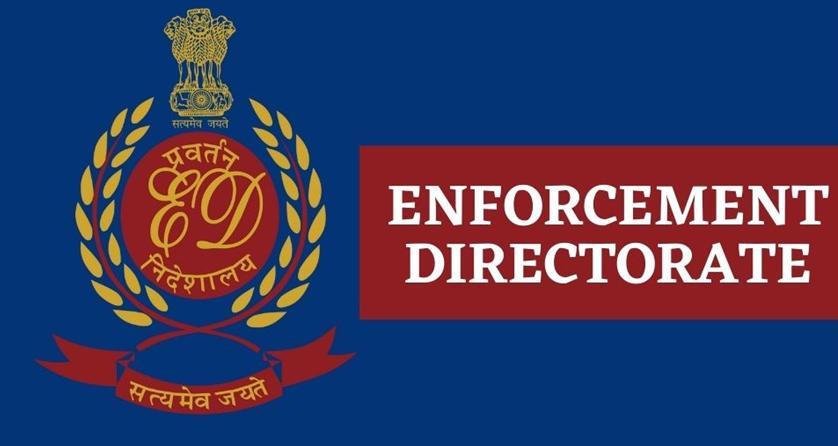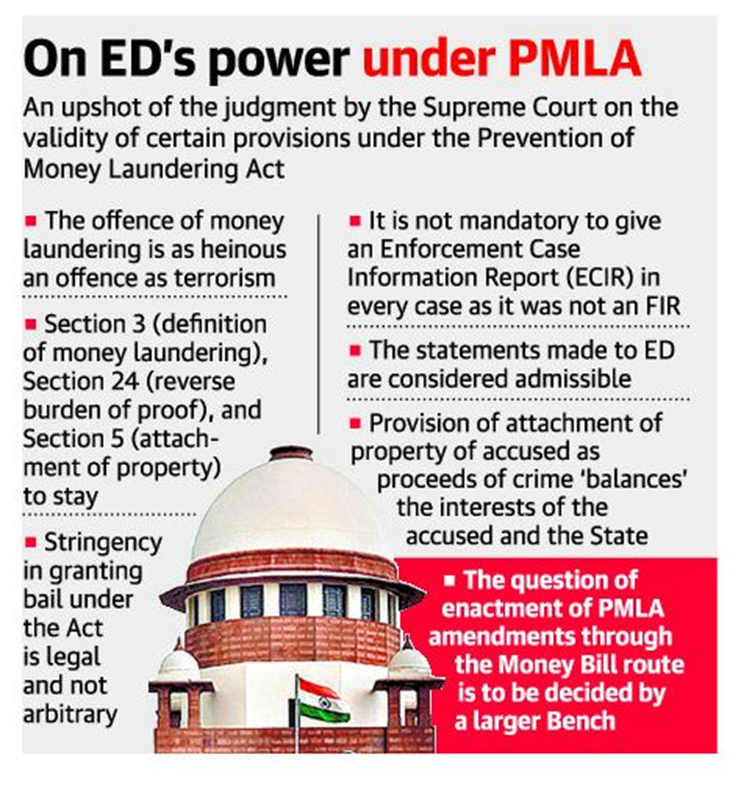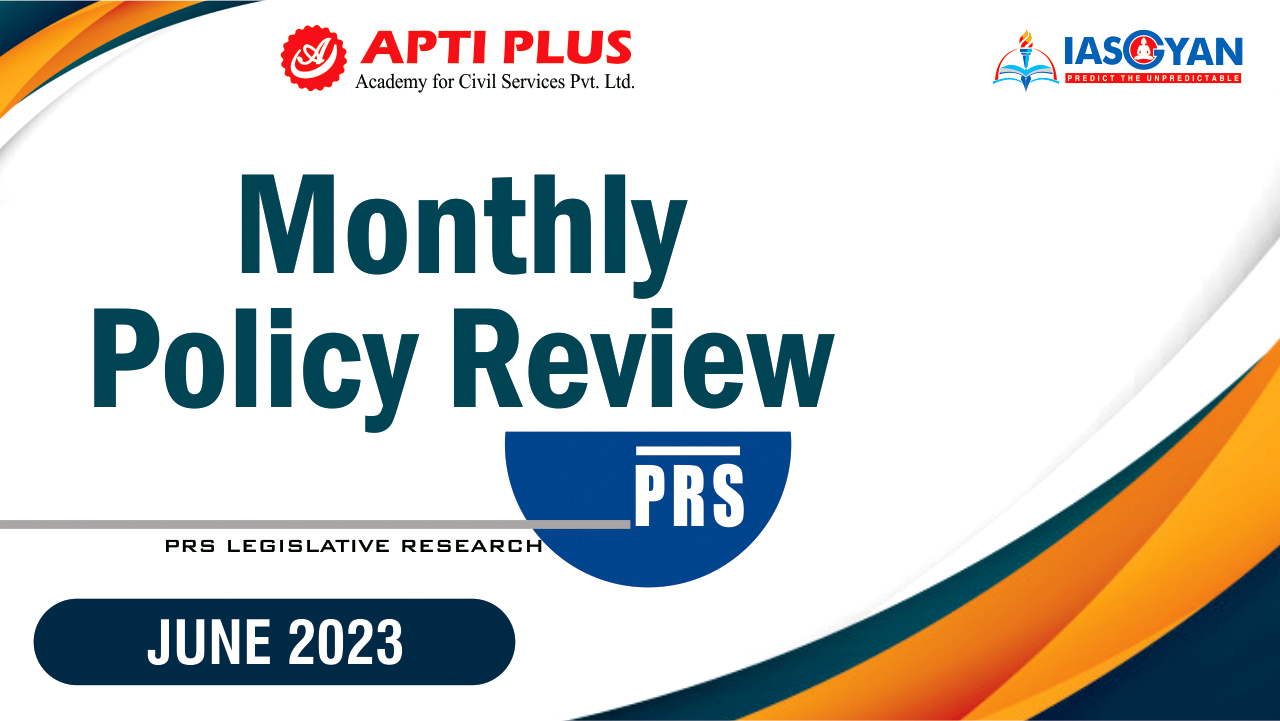Description

Copyright infringement not intended
Context: The Madras High Court confirmed the constitutionality of an Enforcement Directorate (ED) arrest and further remand in judicial custody of a Tamil Nadu Minister in a money-laundering case tied to a cash-for-jobs scheme.
Details
- The judge concluded that the ED can interrogate any person implicated in a case registered under the Prevention of Money Laundering Act (PMLA), 2002.
Enforcement Directorate (ED)
About
- The Enforcement Directorate (ED) is an economic intelligence and law enforcement agency in India. It operates under the Department of Revenue, Ministry of Finance, and is responsible for enforcing economic laws and fighting financial crimes.
- The Enforcement Directorate primarily focuses on investigating and prosecuting cases related to money laundering and foreign exchange violations under the provisions of the Prevention of Money Laundering Act (PMLA) and the Foreign Exchange Management Act (FEMA).
Key powers and functions of the Enforcement Directorate include:
Investigating Financial Crimes
- The ED is empowered to investigate and enforce laws related to money laundering, foreign exchange violations, and other economic offences. It can initiate investigations based on information from various sources, such as other law enforcement agencies, financial institutions, media reports, or public complaints.
Freezing and Seizing Assets
- The ED has the authority to freeze and seize assets that are suspected to be involved in money laundering or linked to illegal activities. This helps to prevent the transfer or disposal of such assets and preserve them for further legal action.
Attaching Properties
- The Directorate can attach properties that are involved in or derived from money laundering activities, thereby preventing their disposal during the investigation. The attachment order is valid for 180 days and can be extended by the Adjudicating Authority.
Issuing Summons
- The ED can summon individuals for questioning during investigations and require them to provide relevant documents and information. The summons can be issued to any person who is suspected to have a role in or knowledge of the offence.
Arrests
- The agency can arrest individuals involved in money laundering or foreign exchange violations, subject to the provisions of the law. The arrest can be made with or without a warrant, depending on the circumstances of the case
Cooperation with International Agencies
- The ED collaborates with international law enforcement agencies and financial intelligence units to combat transnational financial crimes. It can exchange information and request assistance from foreign authorities under various bilateral and multilateral agreements.
Adjudication
- The ED can adjudicate cases involving violations of FEMA, impose penalties, and confiscate contravening assets. The Adjudicating Authority is a quasi-judicial body that hears the cases and passes orders after allowing the parties involved.

ED Special Power under PMLA
About
- The Enforcement Directorate (ED) is a central agency that investigates economic offences under various laws, such as the Prevention of Money Laundering Act (PMLA), the Fugitive Economic Offenders Act, the Foreign Exchange Management Act and the Foreign Exchange Regulation Act. The ED derives its powers from these laws to inquire, arrest, attach property and seek cooperation from foreign jurisdictions in cases of money laundering and other financial crimes.
What is money laundering and how does the ED deal with it?
- Money laundering is the process of concealing or disguising the source, ownership or use of illicit funds or assets. It is often done to evade taxes, avoid legal consequences or invest in legitimate businesses. Money laundering can have serious implications for the economy, national security and social welfare of a country.
- The PMLA defines money laundering as an offence that involves the acquisition, possession, use, transfer or projection of any property that is derived from or involved in any criminal activity. The PMLA also provides for the attachment and confiscation of such property, as well as the prosecution and punishment of the offenders.
- The ED is the designated authority under the PMLA to investigate cases of money laundering and take appropriate action. The ED can initiate an inquiry based on an FIR or a chargesheet filed by any other agency or authority, or on its information or complaint. The ED can also take suo motu cognizance of any offence under the PMLA.
- The ED has the power to arrest any person who is suspected to be involved in money laundering, after recording the reasons in writing. The ED can also search and seize any property, documents or records that are relevant to the inquiry, with or without a warrant. The ED can also attach any property that is believed to be the proceeds of crime or involved in money laundering, for a period of 180 days, pending confirmation by an adjudicating authority.
- The ED can also seek assistance from foreign countries in matters relating to money laundering, such as obtaining information, evidence, documents, records or property. The ED can do so by sending a letter of request to the central government, which can then forward it to the concerned foreign government or authority under a bilateral or multilateral agreement or arrangement.

What are the challenges and limitations faced by the ED?
Lack of adequate manpower and resources
- The ED has a sanctioned strength of about 2,000 officers and staff, but only about half of them are in position. The ED also faces a shortage of infrastructure, equipment and training facilities.
Delayed and complex legal procedures
- The ED has to deal with multiple laws, authorities and courts in its investigations and prosecutions. The ED also faces frequent challenges to its powers and actions by the accused and other parties. The ED has to follow strict procedures and timelines for attaching and confiscating property, which can be delayed by appeals and revisions. The ED also has to coordinate with other agencies and authorities, both domestic and foreign, which can cause delays and difficulties.
High burden of proof and evidentiary standards
- The ED has to prove beyond reasonable doubt that the property involved in money laundering is derived from or involved in any criminal activity. The ED also has to establish the link between the predicate offence (the underlying criminal activity) and the money laundering offence. The ED has to rely on documentary and electronic evidence, which can be forged, tampered with or destroyed. The ED also faces challenges in obtaining evidence from foreign jurisdictions, which may have different laws, procedures and standards.
Lack of awareness and cooperation from stakeholders
- The ED has to deal with various stakeholders, such as banks, financial institutions, intermediaries, regulators, tax authorities, law enforcement agencies, judiciary and civil society. The ED faces challenges in creating awareness and sensitization among these stakeholders about the menace of money laundering and the role of the ED. The ED also faces challenges in obtaining cooperation and coordination from these stakeholders in sharing information, reporting suspicious transactions, complying with directions and facilitating investigations.

Conclusion
- The ED is a vital agency in the fight against money laundering and other financial crimes in India. The ED has been empowered by various laws to investigate and prosecute such offences and to attach and confiscate the proceeds of crime. The ED has been active and successful in pursuing several high-profile cases involving prominent personalities and large amounts of money. However, the ED also faces several challenges and limitations in its functioning and effectiveness. The ED needs to overcome these challenges and limitations by enhancing its manpower and resources, streamlining its legal procedures, improving its evidence collection and analysis, and increasing its awareness and cooperation among stakeholders.
Must Read Articles:
Enforcement Directorate (ED): https://www.iasgyan.in/daily-current-affairs/enforcement-directorate-32
|
PRACTICE QUESTION
Q. Investigations into financial violations and cases of money laundering are handled by the Enforcement Directorate (ED), a central organisation. Its functioning has been criticised for being ineffective, biased, and selective. How can the ED deal with sophisticated financial crimes more effectively and with greater credibility?
|
https://epaper.thehindu.com/ccidist-ws/th/th_delhi/issues/44837/OPS/GC0BH87EK.1.png?cropFromPage=true
















